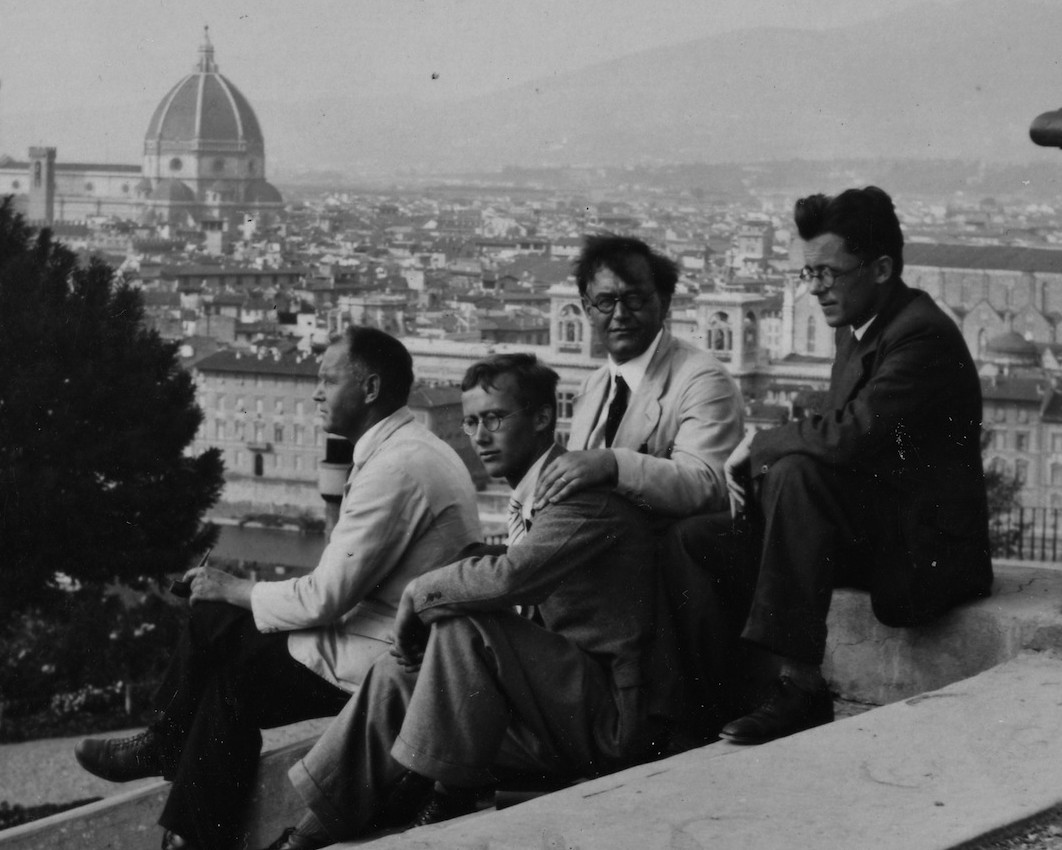
Barth with his brother Peter, his son Markus and Ernst Wolf in Florence, on a happy trip to Italy in September 1934. In Rome Barth wrote his No!, attacking Emil Brunner, and arguing that 'natural theology' was the chief cause of the present confusion in the church. (source: kbarth.org)
In this quotation from Hans Küng's book, Justification: The Doctrine of Karl Barth and a Catholic Reflection, Karl Barth's criticisms of the Council of Trent are presented, and later in the book, Küng responds in an excellent show to Barth's critiques. So much that Barth writes an amazing letter of approval to Küng's book. I previously shared a letter containing a summary of Barth's criticisms of catholicism, but the following quotation gets to the heart of the matter, and that is the question of Justification.
Why are Catholics and Protestants separated brothers and sisters? What is the one issue the divides us all? Is it not, as Martin Luther said, that "justification by faith alone" is the "doctrine by which the church stands or falls"? Marian Dogmas or Papal Infallibility are contentious debates, but Justification is the central doctrine of the Reformation that separates Protestants and Catholics from one another. If it is justification that separates us, what is it specifically about justification that divides the Church?
Küng's Justification is a miraculous answer to our divided Church! In this book, the question of Justification is answered in a way that may unite the global church, and find fulfillment to Jesus' prayer that we would be one as he is one with the Father.
At this point Barth opens up with the second major polemic against Catholic teaching to be found in Volume IV/1 (we have referred to this earlier in connection with the first polemic against the Catholic theology of grace). This is the excursus on the Tridentine teaching on justification. Barth reacts very strongly against the decree of Session IV:
“The decree itself is theologically a clever and in many respects a not unsympathetic document which has caused superficial Protestant readers to ask whether there might not be something to say for it. But if we study it more closely it is impossible to conceal the fact that not even the remotest impression seems to have been made upon its exponents by what agitated the Reformers or, for that matter, Paul himself in this whole question of faith and works” (IV/1, 624f.).
What is the basis for this objection? In Barth’s view the teaching of Trent does not leave intact the sovereign character of justification as a divine work done for man. The parallel to Barth’s first polemic against the general Catholic teaching on grace is obvious. Here as there, Barth’s greatest objection is that the Catholic Church does not take seriously the sovereignty of God; it flounders in anthropocentricity. Barth regards the decree of Trent as impaired by this lack of light from above. This, he contends reduces divine justification to a physical process taking place within the human subject.
It is on this basis that Barth makes his judgment about individual features of the Catholic teaching on justification—about the death of Christ as merely the cause instrumentalis, about the Church as a salvific institution, about human co-operation and human acts of preparation, about Baptism as cause instrumentalis, about the link between justification and sanctification, about the nature of justifying grace, about the repetition of justification in the sacrament of Penance, and especially about the condemnation of fiducial faith.
“The decisive polemical sentence of the Tridentinum is as follows: ‘Anathema sit,’ whoever maintains [‘that justifying faith is nothing else than confidence that divine Mercy remits sins for Christ’s sake, or that it is confidence alone that justifies us’ (Can. 12: D 822)]. Now Paul certainly spoke of love and hope as well as faith, and if our thinking is to be Pauline we must follow him in this. But in the matter of man’s justification he spoke only of faith. And if faith undoubtedly has for him other dimensions than that in which in relation to man’s justification it is fiducia divinae misericordiae peccata remittentis propter Christum, yet there can be also no doubt that in the contexts in which he connects dikaiosyne and piotis faith is just this and nothing but this: the confidence of sinful man in Jesus Christ, a demonstration in which he finds that his sins are forgiven. If there is any corresponding faithfulness of sinful man to the faithful God, it consists only in this confidence. As he gives God this confidence, he finds himself justified, but not otherwise. That was what the Reformers maintained.
“They did not have the unequivocal backing of Paul for all their statements. But they undoubtedly had it for this statement” (IV/1, 626).
The reading of this excursus makes the cleft between Barthian and Catholic theologies of justification seem hopeless and unbridgeable. Are not all points of common agreement ruthlessly obliterated here?
We shall have to return later to this excursus. For the time being let us insist again that Barth’s concept of justification—and this is the norm by which he measures Trent—denotes the divine judgment executed in Christ’s death on the cross and revealed in His resurrection, a work which is totally divine. Only by keeping this in mind is it possible to understand the violence of Barth’s reproaches. And all this raises a question. Is Barth’s concept of justification founded in revelation? Does the Cahtolic Church have another concept of justification which cannot be harmonized with the Barthian? Are we talking of two different things and therefore talking over each other’s heads? Or of different aspects and thus unwittingly talking to one another?
Hans Küng, Justification: The Doctrine of Karl Barth and a Catholic Reflection, pg75-77
Related: Hans Küng, Justification, Justification: The Doctrine of Karl Barth and a Catholic Reflection, Karl Barth, Marian Dogmas, Papal Infallibility, Trent



Leave a comment